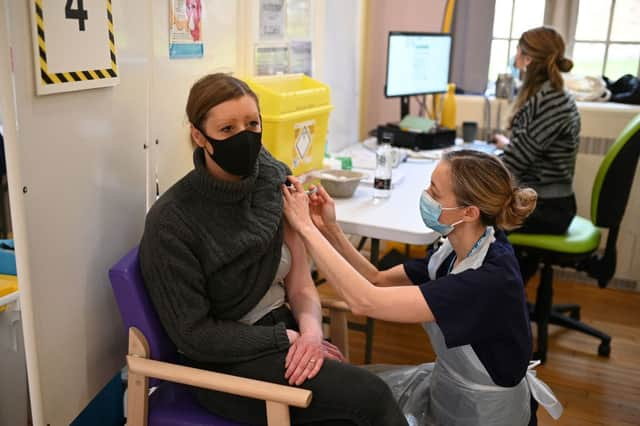Booster jab triggers immune response in ‘two to three days’ - not weeks


The Covid-19 booster jab will trigger an immune response in a matter of days, rather than weeks, scientists have said.
Experts now believe the effects of the third jab start to kick in within just two to three days - a much quicker response than the two weeks the first jab takes to prime the immune system to fight the virus.
Advertisement
Hide AdAdvertisement
Hide AdThe findings mark positive news as the UK battles to control the surge in coronavirus cases sparked by the Omicron variant, which appears to be capable of infecting those who have already had two vaccine doses.
When does the third jab start to work?
Gary McLean, a professor in molecular immunology at London Metropolitan University, said the immunity generated after a booster jab“will rise much quicker” than after the first and second doses.
The faster response is due to the fact that crucial memory cells activated after the first dose are still present in the body, and so they “do not require the two-week activation and instruction phase they initially go through”.
These memory cells – T and B – seek out infected cells and produce antibodies that stop Covid-19 from gaining entry in the first place, and mean the immune system is on alert for any sign of the virus.
Advertisement
Hide AdAdvertisement
Hide AdProf McClean explained: “That can then translate into boosted antibody levels and other increases in active T cells within days of the booster.
“It is likely that maximal immune activity is reached seven days after the booster.”
Professor Charles Bangham, an immunologist and co-director of the institute of infection at Imperial College London, said that in a secondary or subsequent immune response, T cells and antibodies should start to be detectable within “two to three days” of a booster.
Will the booster protect against Omicron?
A booster jab sees the risk of symptomatic infection with the Omicron variant “significantly reduced”, according to health officials.
Advertisement
Hide AdAdvertisement
Hide AdEarly analysis by the UK Health Security Agency (UKHSA) found that a third dose prevents about 75% of people from getting any symptoms.
While this has since been revised down to 70%, a third jab is thought to offer even higher protection from hospitalisation and death.
Are there any side effects from the booster?
As with the first and second vaccine doses, it is common to experience some side effects after your booster.
Symptoms can vary from person to person, with some people not suffering any side effects at all.
Advertisement
Hide AdAdvertisement
Hide AdThe NHS said that in most cases, side effects from the jab will be mild and should only last for a few days.
The most commonly reported symptoms include:
- a sore arm at the site of the injection
- muscle aches
- joint pain
- fever
- chills
- tiredness
- headache
- nausea
You can take painkillers, such as paracetamol, to help ease the symptoms, but if they worsen and you are concerned, you should call 111 for advice.
How fast is Omicron spreading in the UK?
The UK recorded more than 88,376 new Covid cases on Thursday (16 December), which was almost 10,000 up on the day before at 11,708 confirmed cases.
Professor Chris Whitty told the Commons Health and Social Care Committee that he believes the doubling rate for Omicron will slow down, as it is clear people are already taking precautions.
Advertisement
Hide AdAdvertisement
Hide AdAt a certain point, people will have immunity either from boosters or Omicron infection, which will also slow down the doubling time, he said.
Prof Whitty explained: “I think what we will see with this, and I think we are seeing it in South Africa, is that the upswing will be incredibly fast even if people are taking more cautious actions – as they are – that will help slow it down, but it is still going to be very fast.
“It will probably peak really quite fast and my anticipation is it may come down faster than previous peaks, but I wouldn’t want to say that for sure.
“In terms of where we are going over the next few weeks, the rate of increase is going to be quite impressive.”
This article originally appeared on our sister site, NationaWorld.